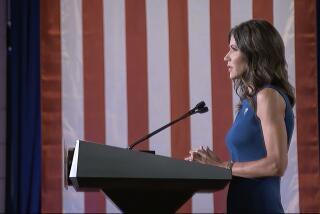Bush, Top Lawmakers Reach Agreement on Deficit Package : Budget: The 11th-hour compromise heads off $85 billion in automatic spending cuts that would have gone into effect this morning. Action is designed to slash the deficit by $500 billion over the next five years.
President Bush and congressional leaders, capping months of often-acrimonious negotiations, reached agreement Sunday on a sweeping package of tax increases and spending cuts designed to slash the federal budget deficit by $40 billion this fiscal year and by a total of $500 billion over the next five years.
The eleventh-hour agreement, which heads off $85 billion worth of automatic, across-the-board spending cuts that would have gone into effect this morning if the talks had failed, was hailed both by Bush and top lawmakers as a historic breakthrough in the decade-long budget stalemate between Republicans and Democrats.
“It is balanced, it is fair and in my view it is what the United States of America needs at this point in its history,” Bush said, surrounded by congressional leaders and aides, in a midafternoon ceremony in the Rose Garden outside the White House.
Bush interrupted a round of meetings at the United Nations in New York to return here for the announcement.
House Majority Leader Richard A. Gephardt (D-Mo.), who had led the closed-door bargaining sessions since they began in May, agreed. “The alternative to this agreement is fiscal chaos,” he said.
“What delayed us for months is what has divided us for a decade,” he added. “The parties to these talks . . . continue to have deep disagreements over values, the role of government and the fairness of our taxes. But we all made compromises in the national interest.”
The package, if approved by Congress, would increase taxes on gasoline, cigarettes and alcoholic beverages; raise Medicare premiums; impose a new tax on luxury goods, and scale back itemized deductions for all taxpayers with incomes above $100,000.
Overall, taxes would rise $134 billion over the next five years.
Under the budget agreement, federal spending would be subject to firm caps, reducing government outlays for domestic and military programs by $182.4 billion--with the bulk of the savings likely to come out of the Pentagon’s hide.
At the same time, the new budget pact is designed to restrain the growth of long-standing benefit programs such as Medicare and farm subsidies for additional savings of $119 billion.
Under the agreement, the two houses will have until Oct. 19 to pass final compromise legislation needed to carry out the budget pact--including enactment of 13 appropriations bills that are necessary to provide for government spending in fiscal 1991, which begins today.
But the accord--which has already set off howls of protest from dozens of affected interest groups--must still overcome widespread resistance among lawmakers, who fear that angry voters might retaliate by throwing them out of office this November.
“I have great reservations about supporting the agreement until I look realistically at the alternatives,” said Rep. Julian C. Dixon (D-Los Angeles). “The impact of the gas tax is going to hit very hard in Southern California. It’s not a done deal.”
House Minority Whip Newt Gingrich (R-Ga.), also a participant in the budget negotiations, boycotted the White House ceremony and told reporters that he is “still looking at” the accord. Rebellious House Republicans criticized the package and vowed to try to defeat it.
The GOP lawmakers expressed their frustration at a closed-door caucus that was so raucous it could be heard easily in the hall outside.
Rep. C. Christopher Cox (R-Newport Beach), a former aide in the Ronald Reagan White House, called the budget agreement “an economic Yalta. This is a complete sellout. . . . The American people won’t buy it and certainly the Republican conference won’t buy it.”
But congressional leaders expressed optimism that the initial wave of opposition would diminish as lawmakers face an up-or-down vote on whether to approve the deficit-reduction package intact or bring on the automatic cuts mandated by the Gramm-Rudman deficit reduction law.
“The alternative to this package is economic crisis,” said Rep. Leon E. Panetta (D-Carmel Valley), chairman of the House Budget Committee, “not only from continuing high interest rates . . . but also from the disastrous . . . Gramm-Rudman cuts that will take effect if the agreement is not approved.”
The final compromise, forged in an all-night session that lasted until dawn, would slice $40 billion off the deficit expected for fiscal 1991--a full $10 billion short of the $50-billion reduction that negotiators originally wanted to achieve.
Even with the agreement, the largest deficit-reduction plan ever proposed, the deficit for the new fiscal year still is expected to hit a record $253.6 billion--partly because of the slowdown in the nation’s economy.
In a briefing for reporters, Richard G. Darman, director of the White House Office of Management and Budget, acknowledged that a deteriorating economy and the growing cost of protecting savings and loan depositors meant that officials had to struggle harder and harder just to keep the deficit from growing.
Officials said that the big payoff under Sunday’s accord, however, will come starting in fiscal 1993, when most of the S&L; bailout should be finished.
Under the plan, which assumes that the economy will achieve only modest gains during the coming year and rebound strongly in future years, the deficit would fall to $129.4 billion in 1993 and turn into a modest budget surplus of $16.7 billion in 1994.
In abandoning the old Gramm-Rudman targets, which had called for a $64-billion deficit in fiscal 1991, the budget negotiators set new goals for future years, with hopes of balancing the budget by 1994 and building up substantial Social Security surpluses starting in 1996.
But if the economy plunges into a recession, the targets would be modified in March--so lawmakers would not have to make additional spending cuts or raise taxes further to achieve the goals set under Sunday’s accord.
Initial reaction in Congress was positive. The two houses, meeting in an extraordinary Sunday session for the first time in nearly a decade, quickly approved stopgap legislation that would postpone the Gramm-Rudman cuts until Oct. 5 when another vote must be taken.
The House rammed through the measure on a 382-41 roll call after less than an hour of debate. The Senate approved it shortly afterward.
In the same bill, lawmakers agreed to continue federal spending roughly at current levels for the rest of this week while Congress considers the compromise deficit reduction package hammered out at the budget summit.
Overwhelming votes in the House and Senate, however, did not signal how lawmakers will react when it comes to the final showdown, which is scheduled to occur before Oct. 19.
In one of the final disputes of the budget negotiations, Bush abandoned his effort to win a reduction in the capital gains tax rate. The White House was unwilling to accept higher income tax rates on the wealthy, which Democrats demanded as the price for accepting a lower tax on investment profits.
The two sides also agreed not to tamper with Social Security benefits, often called the “third rail” of American politics because those who touch them risk almost certain political death. Proposals to increase taxes on Social Security or to restrain the growth in benefits fell victim to both parties’ fears of well-organized elderly voters.
The most severe cuts would affect the military--$10 billion right away and up to $182 billion over five years.
Among the tax measures was a sharp boost in federal gasoline taxes from its current 9 cents per gallon to 21 cents. The increase would be phased in, starting with a 5-cent-a-gallon gasoline tax hike in December, a separate 2-cent-per-gallon tax applied to all petroleum fuels in January, and an additional 5-cent gasoline tax increase next July.
(California boosted its own gasoline taxes by 5 cents a gallon last August, and will raise them by 1 cent a gallon each year beginning next January.)
Taxes on alcoholic beverages would rise as well.
Luxury items such as expensive cars, jewelry and furs will be subject to a new 10% tax. And all taxpayers with incomes above $100,000 will find that they no longer will receive full credit for their itemized deductions.
But the package contains some modest new tax reductions as well--which Republicans argued were needed to help the economy. Companies that explore for gas and oil, conduct research or do business in depressed urban and rural areas will qualify for tax advantages.
Overall, the Medicare program, whose costs are growing by leaps and bounds, would be cut to provide some $60 billion in savings--split evenly between recipients and physicians or hospitals.
Farm support programs would be cut $13 billion over five years. Changes in the way payments are made to civil service retirees and postal workers would save $12 billion.
The top-level budget discussions produced extraordinary political conflict over tax and spending priorities, dramatically displaying the rival approaches of the Democratic and Republican parties.
At first, shortly after the talks started, Bush dismayed conservative Republicans when he reneged on his famous “no new taxes” campaign pledge by acknowledging, at Democratic insistence, that revenue increases would have to be part of any deficit-cutting agreement.
At the outset of the serious bargaining, Democrats favored larger cuts in Pentagon outlays but, after the Persian Gulf crisis erupted, softened their position and agreed that funds for Operation Desert Shield should not be included in the deficit-cutting package.
Both sides agreed almost immediately that the Gramm-Rudman deficit goal of $64 billion was out of reach, settling on a plan to produce a package that would allow them to delay the timetable for balancing the budget.
For months, both sides debated options without the formal give-and-take of negotiations. Bush’s negotiators insisted almost to the end on cutting capital gains taxes--a major Bush campaign pledge and part of the White House strategy for enlisting the support of anti-tax Republicans.
Democrats, however, doggedly opposed the capital gains tax cut, insisting that they could not accept a tax break that primarily would benefit the wealthiest taxpayers while most Americans were being called on to sacrifice.
The deadlock persisted through a monthlong August recess and the negotiators decided to move the talks to nearby Andrews Air Force Base in Maryland to get away from reporters, lobbyists and other distractions in their usual Capitol Hill setting.
While some progress was reported at the military base, 11 days of isolation failed to produce a solution and the bargaining was turned over to a “super-summit” composed of the five top congressional leaders and the Bush team, led by Darman and including White House Chief of Staff John H. Sununu and Treasury Secretary Nicholas F. Brady.
In addition to congressional leaders of both parties, representatives of the budget, appropriations and tax-writing committees were included in the 21-member group that labored for months to achieve the budget deal.
Economic IMPACT: Analysts say the budget package probably will make things worse before they get better; related stories. A12, A13
THE SHRINKING DEFICIT In billions of dollars
Baseline deficit 1991 1992 1993 1994 1995 Total No changes in current law. 293.7 306.1 227.3 115.8 84.5 1027.4 Includes S&L; bailout and Social Security surplus.
Proposed savings -40.1 -76.7 -97.9 -132.5 -152.8 -500.0
Projected deficit (surplus) 253.6 229.4 129.4 (16.7) (68.3) 527.4
Note: Based on revised economic assumptions that project little growth this year, modest economic gains in 1991 and solid expansion in following years.
Source: Office of Management and Budget
More to Read
Get the L.A. Times Politics newsletter
Deeply reported insights into legislation, politics and policy from Sacramento, Washington and beyond. In your inbox three times per week.
You may occasionally receive promotional content from the Los Angeles Times.






